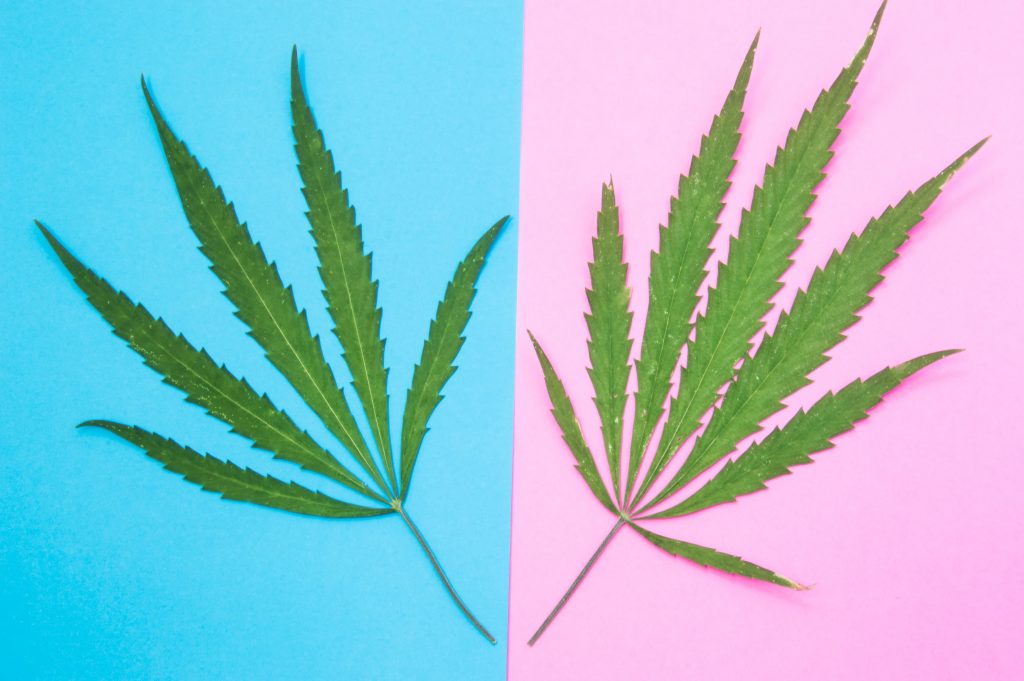When it comes to the majority of political issues – including support for social services and government spending, environmental regulation, equal rights, prison reform, mental health, and so on – women tend to lean more liberal than men. One of the few hot-button topics where more women seem to skew conservatively, is cannabis legalization, surprisingly.
According to a Gallup survey conducted late last year, American support for cannabis legalization is at an all-time high of nearly 70 percent. However, despite the fact that a growing number of adults are in favor of weed reform, it seems that women are somewhat less open to the idea than men. A few other studies and surveys over the years shared similar findings.
So, what is the reason for this gender gap? Is it related to religion, politics, or parenthood? Or is because, historically, women have always faced greater stigma than men for engaging in what society considers “deviant” behavior? Is it a combination of all these different elements? Let’s explore this further.
As with most things in this world, cannabis use is not uniform across the board. Opinions vary based on age, religious beliefs, gender, and many other factors. But as a whole, it seems that most people are becoming increasingly supportive of reform efforts, and we’re here to keep you updated on these changes every step of the way. Subscribe to THC Weekly Newsletter for tons more stories like this one. Plus, gain access to exclusive deals on flowers, vapes, edibles, and much more, along with premiere offers on cannabinoids, like HHC-O, Delta 8, Delta 9 THC, Delta-10 THC, THCO, THCV, THCP & HHC, which will save you lots of $$. You can find them in our “Best-of” lists!
The cannabis gender gap
Using data from Pew Research Center surveys, researchers from North Carolina State University and Hartwick College conducted a new meta-analysis of their results and tested several different hypotheses to try and see if they could figure out more about this gender gap. They published their results in the Social Science Quarterly. Although the numbers vary slightly based on the specific survey conducted, on average, just under 70 percent of men support cannabis legalization, while only about 60 percent of women do. The numbers run parallel to gendered patterns of recreational use, in which similar figures have been reported.
Overall, it seems that among adolescents, males are more likely to use cannabis than females, and that continues into adulthood. These numbers remained constant whether cannabis was legal in the respondents’ areas or not. Additionally, among those who did use cannabis, there were gender-based differences in the way it was being used. Women were more likely to use it therapeutically, and the most common conditions listed were nausea, anxiety, and migraines.
This makes a lot of sense, when we consider how standard medications are prescribed to women versus men. Statistics show that women are more likely than men to use antidepressants, anti-anxiety, and anti-pain medications, although rates of diagnosis between both genders are practically the same. Women also typically seek medical treatment earlier and more frequently than men, and about 14 percent more women reported taking vitamins and supplements than their male counterparts.

All-that said, it’s no surprise that among women, especially middle-aged to older women, the idea of using cannabis medicinally is a much easier-to-swallow pill than full-scale recreational legalization. Even so, the gender gap has certainly narrowed over the years and will likely continue to do so. In 2018, 68 percent of men supported cannabis legalization, while only 56 percent of women did. By late last year, these numbers were at 68-61. What’s interesting is that the number of men who support cannabis reform is now remaining stagnant, and the number of women who are flipping the switch is growing.
The conservative mother theory
A common assumption when it comes to women and cannabis, is that mothers are more inclined to oppose cannabis legalization efforts. This is, though, just an assumption that’s not rooted in fact whatsoever. It’s true that parenthood is political, and parents tend to support policies that help children and prevent crime. From this perspective it makes sense that mothers who are intent on protecting their children would oppose policies that are lenient toward any type of substance use, not just cannabis.
Fascinatingly, that appears to not be the case at all. When this theory was tested, it was noted that mothers and fathers were just as likely to support cannabis legalization as men and women without children. When it came to harder drugs with more addictive tendencies, that’s where many began to draw the line, but views on cannabis were fairly liberal.
“Being a parent is not a predictor of attitudes on the marijuana support scale,” says Steven Greene, Professor of political science at North Carolina State University, and co-author of the study. “When the demographics-only model is run without the parenthood variable (not shown) and then with the parenthood variable added, the coefficient for gender does not change at all, indicating that being a parent does not account for any of the gender gap.”
The real cause of the divide
Numerous different tests were conducted to see if there was a “why” that could be explained. The first analysis looked at gender alone, to establish a baseline, then added different demographic variables to see which ones had the largest impact on cannabis-related opinions. They examined political party affiliation, age, education level, income, race, parenthood, marital status, religious affiliation/commitment, and past use patterns.
Political party affiliation, age, education, and church attendance were all somewhat significant, with results implying that younger, liberal, higher-educated, and non-religious women were more likely to be in favor of cannabis legalization. Older and conservative women were more inclined to be opposed altogether or more prefered medical legalization only. Race, marital status, and parenthood all proved largely insignificant in all these analyses.

But all the aforementioned factors were no longer noteworthy when past cannabis use was accounted for. According to the study authors, “Personal use had the strongest influence of all the variables considered, indicating that those who had ever used were more likely to support legalization than those who had never used marijuana, even when considering all the other factors.”
Familiarity and comfortability
So, if past use and familiarity are the common denominators in whether someone is more likely to support cannabis legalization or not, the next question is… why are men more often more comfortable with cannabis than women? When we think of stoners, we tend to think of carefree young males, and we’re not entirely off base with that association.
Statistically speaking, women were less likely to report having ever trying cannabis at all. Approximately 55 percent of men reported having tried cannabis at some point in their lives, compared to only 42 percent of women. Women also reported feeling “uncomfortable” around the plant and in regards to the industry in general.
Considering how beneficial cannabis can be for women, I personally find these results jarring. Why aren’t more women at least trying it? It’s honestly hard to say, because in my own experience, most of the women I’ve met are cannabis-friendly. Aside from personal preferences, it could stem from historical double standards. Typically, women who engage in risky behavior are judged more harshly than men who engage in similar or even riskier activities. This includes but is not limited to drug use and sexual activity, the two of which are often believed to go hand in hand.
And in that same vein, women have been (and still are to some extent) restricted in how and when they can express their sexuality. Because the general consensus is that drugs lower inhibitions, and lowered inhibitions can lead to more satisfying sexual experiences, and women have been sexually oppressed since the earliest documented human civilizations, it’s no surprise that women face more stigma for using mind altering substances as well.
Final thoughts
It’s important to note that this gender gap, although present, is not very large and getting smaller with each passing day. Researchers believe that this will be a non-issue as soon as a few years down the line.
“Though it is challenging to accurately predict the future contours of the gender gap in marijuana, we do think our findings here are instructive,” the team wrote. “As marijuana use becomes more common and seen as less risky or deviant behavior, and as marijuana use is framed less as a moral issue (which will presumably be the case as it grows more common and legalized), there is reason to expect the gender gap to shrink.”
Hello readers! Welcome to CBDtesters.co, your #1 web spot for the best independent news coverage of the cannabis and psychedelics-related industry, relevant to today. Join us whenever possible to stay in-the-loop on the constantly-changing universe of legal drugs and industrial hemp, and sign up for The THC Weekly Newsletter, to ensure you’re always on top of the latest story.
Disclaimer: Hi, I’m a researcher and writer. I’m not a doctor, lawyer, or businessperson. All information in my articles is sourced and referenced, and all opinions stated are mine. I am not giving anyone advice, and though I am more than happy to discuss topics, should someone have a further question or concern, they should seek guidance from a relevant professional.
Cannadelics: Beyond Psychoactive
Cannabis, Psychedelics & Consciousness Drugs







